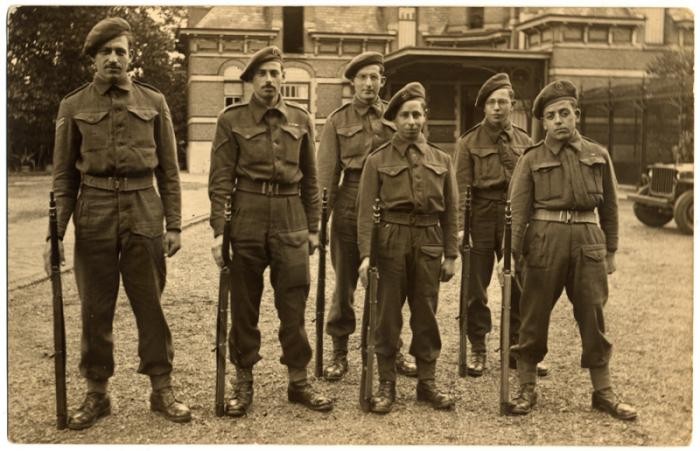
Jewish Brigade Group
Beginning in 1920, Great Britain ruled Palestine under a mandate created by the League of Nations. The British were to facilitate the establishment of a modern Jewish homeland. Due to Arab opposition to the proposed Jewish homeland in Palestine, the British initially refused to establish a separate fighting unit of Jewish volunteers from Palestine. However, wartime manpower requirements and the strategic need to defend the Middle East induced the British to permit the formation of 15 Palestinian Jewish battalions. These units were incorporated into the British army in September 1940.
Jewish units fought with the Allies in Greece in 1941; 100 Palestinian Jews were killed there and 1,700 captured by the Germans. On August 6, 1942, the British army formed a Palestine Regiment out of three Jewish and one Palestinian Arab battalion. The regiment fought in Egypt and in the battles of North Africa.
The Jewish Brigade Group of the British army, which fought under the Zionist flag, was formally established in September 1944. It included more than 5,000 Jewish volunteers from Palestine organized into three infantry battalions and several supporting units. Under the command of Brigadier Ernest Benjamin, the Jewish Brigade fought against the Germans in Italy from March 1945 until the end of the war in May 1945.
After the German surrender, the Jewish Brigade was stationed along the Italian border with Austria and Yugoslavia, and later in Belgium and the Netherlands. Some soldiers from the Brigade helped create displaced persons camps for Jewish survivors of the Holocaust. Brigade members also became involved in organizing the flight of Jewish refugees from eastern Europe and their clandestine entry into Palestine. Individual soldiers acquired arms for the Hagana, the major Jewish underground defense organization in Palestine.
Britain disbanded the Jewish Brigade Group in the summer of 1946. Some 30,000 Jewish volunteers from Palestine served with the British forces during World War II. More than 700 were killed during active duty.

